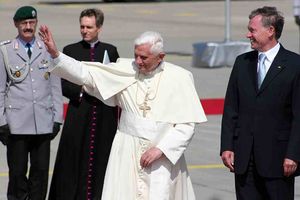Pope Benedict XVI: Difference between revisions
imported>Peter Jackson No edit summary |
imported>Richard Nevell (Add photo) |
||
| Line 1: | Line 1: | ||
{{subpages}} | {{subpages}} | ||
{{Image|Benedict XVI, 2005.jpg|right|300px|Pope Benedict XVI (centre) in 2005}} | |||
'''Pope Benedict XVI''', Latin '''''Benedictus''''', original name '''Joseph Alois Ratzinger''' (born 16 April 1925, [[Marktl am Inn]], [[Bavaria]], Germany), was the leader of the [[Roman Catholicism|Roman Catholic Church]]. He was elected on 19 April 2005, following the death of [[Pope John Paul II]]. | '''Pope Benedict XVI''', Latin '''''Benedictus''''', original name '''Joseph Alois Ratzinger''' (born 16 April 1925, [[Marktl am Inn]], [[Bavaria]], Germany), was the leader of the [[Roman Catholicism|Roman Catholic Church]]. He was elected on 19 April 2005, following the death of [[Pope John Paul II]]. | ||
Revision as of 08:48, 3 March 2013
Pope Benedict XVI, Latin Benedictus, original name Joseph Alois Ratzinger (born 16 April 1925, Marktl am Inn, Bavaria, Germany), was the leader of the Roman Catholic Church. He was elected on 19 April 2005, following the death of Pope John Paul II.
Before becoming Pope, Ratzinger had been an academic theologian, and was later Prefect of the Congregation for the Doctrine of the Faith.
As Pope, he was theologically conservative and traditionalist. He authored three Papal encyclicals: Deus Caritas Est ("God Is Love", a 2005 treatise on Christian love), Spe Salvi ("In Hope We Are Saved"; in 2007, on Christian hope) and Caritas in Veritate ("Charity in Truth"; in 2009, "On Integral Human Development in Charity and Truth").
Benedict XVI visited the United States, Israel, Palestine, Jordan, Brazil, Poland, Spain, Germany, Austria, France, Malta, Turkey, Cameroon, Angola and the United Kingdom.
He resigned on 28 February 2013, having said advancing age had deprived him of strength to carry on; he retained his title as emeritus.
